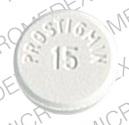Neostigmine Disease Interactions
There are 6 disease interactions with neostigmine.
- Bradycardia
- Coronary artery disease
- Parkinsonism
- Intestinal/urinary obstruction
- Hyperthyroidism
- Hepatic impairment
Cholinesterase inhibitor (applies to neostigmine) bradycardia
Major Potential Hazard, High plausibility. Applicable conditions: Arrhythmias
Due to their pharmacological action, cholinesterase inhibitors can have a vagotonic effect on the sinoatrial and atrioventricular nodes producing bradycardia or heart block. Therapy with cholinesterase inhibitors should be administered cautiously in patients with preexisting bradycardia or underlying cardiac conduction abnormalities. Syncopal episodes have been reported. Atropine may be used to reverse bradycardia produced by cholinesterase inhibitors.
Cholinesterase inhibitor (applies to neostigmine) coronary artery disease
Major Potential Hazard, High plausibility. Applicable conditions: Ischemic Heart Disease
The use of cholinesterase inhibitors has been associated with a constriction of coronary arteries. Therapy with cholinesterase inhibitors should be administered cautiously in patients with coronary artery disease.
Cholinesterase inhibitor (applies to neostigmine) parkinsonism
Major Potential Hazard, High plausibility.
Cholinesterase inhibitors should be used with caution in patients with parkinsonism. Some of these drugs might be contraindicated in these patients (refer to specific prescribing information). Symptoms of Parkinson's disease may be exacerbated with the increase in cholinergic activity. Caregivers and patients should be advised.
Neostigmine (applies to neostigmine) intestinal/urinary obstruction
Major Potential Hazard, Moderate plausibility. Applicable conditions: Intestinal Obstruction, Urinary Tract Obstruction
Neostigmine is contraindicated in mechanical obstruction of the urinary or intestinal tract and peritonitis.
Cholinesterase inhibitor (applies to neostigmine) hyperthyroidism
Moderate Potential Hazard, High plausibility.
Many of the manifestations of hyperthyroidism may be exacerbated by increased levels of acetylcholine produced by cholinesterase inhibitors. Therapy with cholinesterase inhibitors should be administered cautiously to patients with hyperthyroidism. Monitoring of thyroid levels is recommended.
Neostigmine (applies to neostigmine) hepatic impairment
Moderate Potential Hazard, Moderate plausibility. Applicable conditions: Liver Disease
Neostigmine is metabolized by microsomal enzymes in the liver, and the effect of hepatic impairment on pharmacokinetics has not been evaluated. Patients should be carefully monitored if hepatically cleared neuromuscular blocking agents are used, as their duration of action may be prolonged due to hepatic insufficiency.
Switch to professional interaction data
Neostigmine drug interactions
There are 134 drug interactions with neostigmine.
More about neostigmine
- neostigmine consumer information
- Check interactions
- Compare alternatives
- Pricing & coupons
- Reviews (1)
- Latest FDA alerts (1)
- Side effects
- Dosage information
- During pregnancy
- Drug class: cholinergic muscle stimulants
- Breastfeeding
- En español
Related treatment guides
Drug Interaction Classification
| Highly clinically significant. Avoid combinations; the risk of the interaction outweighs the benefit. | |
| Moderately clinically significant. Usually avoid combinations; use it only under special circumstances. | |
| Minimally clinically significant. Minimize risk; assess risk and consider an alternative drug, take steps to circumvent the interaction risk and/or institute a monitoring plan. | |
| No interaction information available. |
See also:
Further information
Always consult your healthcare provider to ensure the information displayed on this page applies to your personal circumstances.


